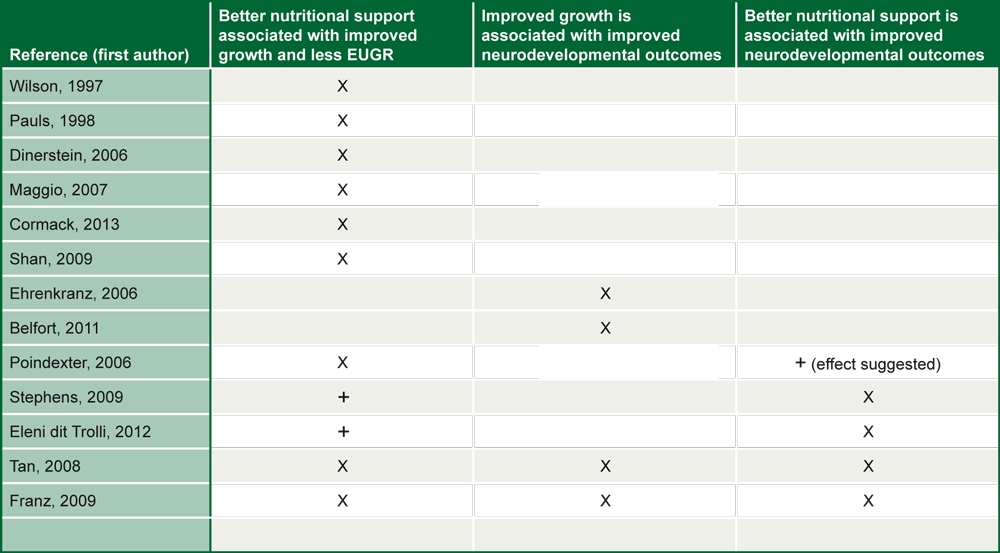Lesson 2: Benefits of Optimal Preterm Nutrition in the Neonatal Intensive Care Unit (NICU)
2.1 Introduction
Optimal nutrition in the NICU aims to achieve a satisfactory functional development of the infant. While the preterm infant is in the NICU, the main goal of the NICU team is actually to provide enough nutrition comparable to that the infant should have received in the womb. However, most infants in the NICU gain less weight than fetuses in utero. As a result, a large number of the infants exhibit extrauterine growth restriction (EUGR), and this subnormal growth often persists into early childhood and even later. A number of clinical studies published in the past years demonstrated a positive relationship between nutritional intervention in the NICU and growth and neurodevelopment outcomes (see table 3).
Analyzing these cohorts suggest that better nutrition support can improve growth and clinical neurological outcomes.
Table 3. Findings in clinical investigations in preterm infants
Source: Ehrenkranz 2014, reprinted with kind permission of S. Karger AG, Switzerland
References:
Belfort et al. 2011, Cormack & Bloomfield 2013, Dinerstein et al. 2006, dit Trolli et al. 2012, Ehrenkranz et al. 2006, Franz et al. 2009, Maggio et al. 2007, Pauls et al. 1998, Poindexter et al. 2006, Shan et al. 2009, Stephens et al. 2009, Tan & Cooke 2008, Wilson et al. 1997
Benefits from Standardized Feeding Guidelines - Despite major progress in understanding the nutritional requirements of preterm infants, large variations in neonatal feeding guidelines exist in the NICUs around the world. In some cases, differences in conduct between groups are even found within the same unit (Ehrenkranz 2007). Evidence has shown that the implementation of standardized feeding guidelines for premature infants, which minimize the variations in feeding practices within and between NICUs, is highly beneficial to the infant. These benefits include improvements in achieving nutritional milestones such as earlier introduction of full enteral feeding, decrease in time of parenteral feeding and a higher growth velocity (McCallie et al. 2011). Standardized feeding regime may also improve early detection and management of feeding intolerance, and is associated with lower incidence of necrotizing enterocolitis (Patole & de Klerk 2005; Gephart & Hanson 2013). To this goal, a recent book published by Karger, "Nutritional Care of Preterm Infants”, edited by Koletzko, Poindexter and Uauy (Koletzko et al. 2014) summarizes the scientific basis and includes practical guidelines for a standardized nutritional care of the premature infant with a global perspective derived from involving contributors from all five continents.

